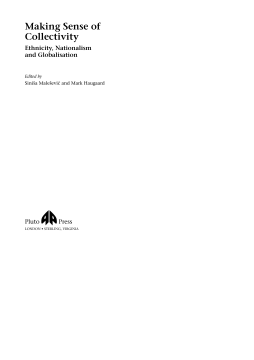
Additional Information
Book Details
Abstract
The collapse of the Cold War, the development of new technologies and the globalisation of the world economy have all had a dramatic impact on societies across the globe.
Migration, new types of wars and changing borders mean that even the stability and security of nation-states has become a thing of the past. New nationalisms, new social movements and the resurgence of identity politics all indicate that we are entering a new era where the very notion of collective identity, through nation states or through transnational identity culture, is challenged.
This volume examines concepts of collective identity, how they are changing and what this means for our future. With contributions from distinguished sociologists including Jenkins, Eisenstadt, Rex, Bauman and Hall, it gives a radical new overview of collectivity theory - a topic that lies at the heart of sociology, anthropology and political science.
Table of Contents
| Section Title | Page | Action | Price |
|---|---|---|---|
| Contents | iii | ||
| Introduction: The Idea of Collectivity | 1 | ||
| References | 11 | ||
| 1. Different Societies? Different Cultures? What are Human Collectivities? | 12 | ||
| Collectivity in social science | 14 | ||
| Collectivity as an emergent product of interaction | 17 | ||
| The state of Denmark | 23 | ||
| Beyond societies? | 29 | ||
| References | 31 | ||
| 2. The Construction of Collective Identities and the Continual Reconstruction of Primordiality | 33 | ||
| Part I Analytical considerations | 33 | ||
| Part II Comparative indications: The cultural programme and the construction of collective identities in pre-modern society | 45 | ||
| Part III The construction of collective identities and boundaries in modern societies: the cultural and political programme of modernity | 58 | ||
| Part IV The contemporary scene - beyond the hegemony of the nation and revolutionary state model | 76 | ||
| Notes | 82 | ||
| References | 83 | ||
| 3. The Fundamentals of the Theory of Ethnicity | 88 | ||
| The theoretical problems of community and primordial relations | 89 | ||
| The primordial community in a wider context | 94 | ||
| The expansion of small- scale ethnic communities and the formation of ethnies | 96 | ||
| Ethnic nations and the modernising nation state | 101 | ||
| Nations and empires | 103 | ||
| The breakdown of empire and the post- imperial situation | 106 | ||
| Migrant ethnic communities | 107 | ||
| Policy responses and host society attitudes to immigration | 114 | ||
| Conclusion | 117 | ||
| Notes | 118 | ||
| Referencess | 119 | ||
| 4. Nationalism and Modernity | 122 | ||
| References | 137 | ||
| 5. The Morphogenesis of Nation | 138 | ||
| Realist social theory | 139 | ||
| Conflation in existing theories of nation formation | 146 | ||
| The morphogenesis of nation | 151 | ||
| Notes | 165 | ||
| References | 166 | ||
| 6. Cultural Variety or Variety of Cultures? | 167 | ||
| References | 179 | ||
| 7. A Disagreement about Difference | 181 | ||
| How homogeneous must we be? | 181 | ||
| The melting pot | 184 | ||
| No essence but existences | 187 | ||
| Hopes and fears for the majority of humankind | 191 | ||
| Conclusion | 192 | ||
| Notes | 192 | ||
| References | 193 | ||
| 8. Identity: Conceptual, Operational and Historical Critique | 195 | ||
| The idea of identity | 196 | ||
| Measuring the invisible | 203 | ||
| SCHEMA A Ethnic Identity 1 | 205 | ||
| SCHEMA B Ethnic Identity 2 | 207 | ||
| The identity of ethnic altruism | 208 | ||
| 'Identity' in the historical vacuum | 208 | ||
| Conclusion | 213 | ||
| Notes | 214 | ||
| References | 214 | ||
| Notes on Contributors | 216 | ||
| Index | 218 | ||
| Africa | 45 |
